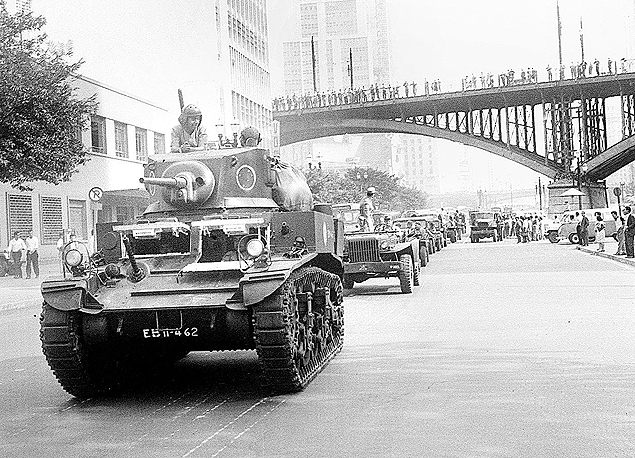Latest Photo Galleries
Brazilian Markets
17h39 Bovespa |
+0,74% | 125.124 |
16h43 Gold |
0,00% | 117 |
17h00 Dollar |
-0,97% | 5,1993 |
16h30 Euro |
+0,49% | 2,65250 |
ADVERTISING
50 Years After the 1964 Coup, the Military Dictatorship Still Bothers Brazil
03/24/2014 - 09h00
Advertising
FROM SÃO PAULO
In March 1964, when army troops took to the streets to overthrow President João Goulart, Dilma Rousseff was a 16-year-old student who cared little about politics. Aécio Neves was a four-year-old boy who liked to play with his grandfather, the then-Congressman Tancredo Neves.
Multimedia Article: All About the Military Dictatorship
Eduardo Campos wasn't born, but remembers to this day the story that his grandfather, Miguel Arraes, at the time governor of Pernambuco, told of the day he was deposed and taken to prison by the military.
Fifty years after the 1964 coup, the three are preparing to go head-to-head in the seventh presidential election in Brazil since the return of the military to the barracks.
It's a different country, which has spent almost three decades in a democratic system where rulers are chosen by the population at regular elections and everyone is free to speak his or her mind without fear of being arrested for their opinions.
In recent years, the country was governed successively by a teacher exiled after the coup, Fernando Henrique Cardoso, a working-class leader jailed during the dictatorship, Luiz Inácio Lula da Silva, and a former guerilla jailed and tortured, Dilma.
The arrival of these people to power shows that the country's transition to democracy was successful, but unable to pacify the controversy provoked by the coup and the dictatorship inaugurated in 1964.
Thousands of people were tortured and hundreds were killed for opposing the military regime, which closed the National Congress three times and kept the press under censure for a decade. But the crimes that occurred during this period are treated until today as taboo in the armed forces.
The government of the generals modernized the economy and had popular support in its early years, but many people grudgingly accept the idea that this happened. Half a century later, the memory of that time still bothers the country.
Translated by JILL LANGLOIS
Read the article in the original language
| João Marques - 14.abr.1964/Acervo UH/Folhapress | ||
 |
||
| 50 years after the 1964 coup, Brazil it's a different country, which has spent almost three decades in a democratic system |



